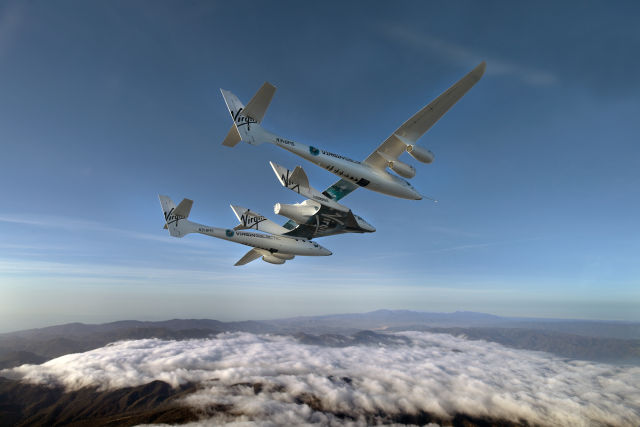
White Knight Two carries the first SpaceShipTwo during a glide test.
Virgin Galactic
Virgin Galactic reported an anomaly on its most recent flight, Galactic 06, which took place 12 days ago from a spaceport in New Mexico.
In a statement released Monday, the company said it discovered a dropped pin during a post-flight review of the mission, which carried two pilots and four passengers to an altitude of 55.1 miles (88.7 km).
This alignment pin, according to Virgin Galactic, helps ensure the VSS Unity spaceship is aligned to its carrier aircraft when mating the vehicles on the ground during pre-flight procedures. The company said the alignment pin and a shear pin fitting assembly performed as designed during the mated portion of the flight, and only the alignment pin detached after the spaceship was released from the mothership.
“During mated flight, as the vehicles climb towards release altitude, the alignment pin helps transfer drag and other forces from the spaceship to the shear pin fitting assembly and into the pylon and center wing of the mothership,” the statement said. “The shear pin fitting assembly remained both attached and intact on the mothership with no damage. While both parts play a role during mated flight, they do not support the spaceship’s weight, nor do they have an active function once the spaceship is released.”
At no time, the company said, did the detached pin pose a safety threat to the spacecraft or the carrier aircraft. Additionally, as the flight occurred in restricted air space, the dropped pin did not threaten people or property on the ground.
The FAA gets involved
Virgin Galactic said it reported the anomaly to the Federal Aviation Administration (FAA) on January 31.
On Tuesday, the FAA confirmed that there was no public property or injuries that resulted from the mishap. “The FAA is overseeing the Virgin Galactic-led mishap investigation to ensure the company complies with its FAA-approved mishap investigation plan and other regulatory requirements,” the federal agency said in a statement.
Before VSS Unity can return to flight, the FAA must approve Virgin Galactic’s final report, including corrective actions to prevent a similar problem in the future.
The problem comes as Virgin Galactic plans to wind down its flight campaign with the VSS Unity and intends to move to its next-generation version of the spacecraft. These so-called “Delta-class” spaceships remain in development and are likely a couple of years away from making commercial flights.
VSS Unity has completed 11 spaceflights to date, reaching an impressive monthly cadence last year. However, the company is planning only one more mission before retiring the vehicle. This decision came as something of a surprise because the company’s president told Ars last August that the Unity airframe was capable of 500 to 1,000 flights.
This Galactic 07 mission, whose passengers and flight crew have yet to be announced, was scheduled for the second quarter of 2024. In its statement this week, Virgin Galactic said it remained committed to flying that mission.

